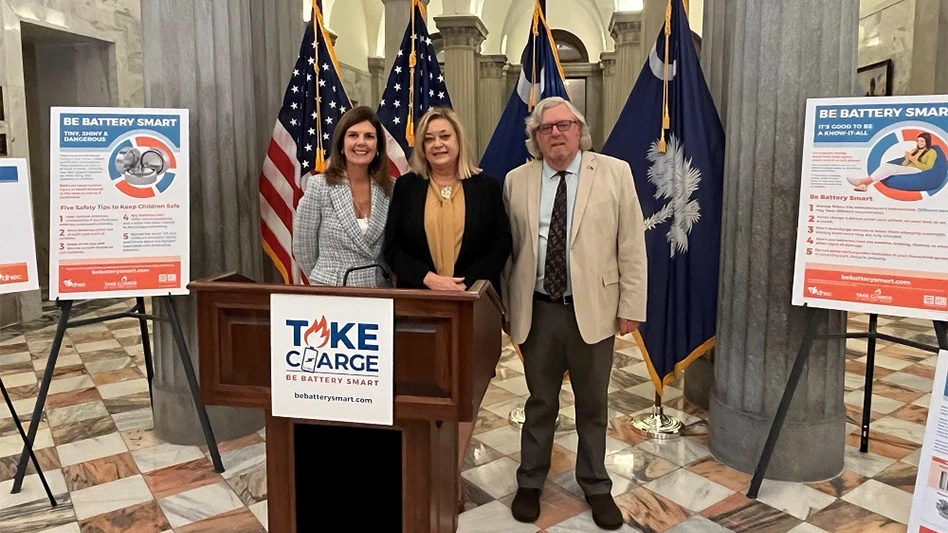
Photo courtesy of ISRI
The Washington-based Institute of Scrap Recycling Industries (ISRI) is part of a public education campaign in South Carolina designed to increase the public’s understanding of the health and environmental benefits of safely recycling household batteries.
The campaign, known as “Take Charge: Be Battery Smart,” is led by the South Carolina Department of Health and Environmental Control (DHEC) and has a partial focus on fire prevention.
“This is an important initiative that affects every South Carolina family,” South Carolina Lt. Governor Pamela S. Evette says. “This campaign will help educate families about the hidden dangers of batteries and the economic benefits of recycling. By responsibly managing batteries, we not only protect our loved ones but also contribute to preserving the critical minerals that make up batteries.”
Evette joined Myra Reece, director of DHEC Environmental Affairs, and Cheryl Coleman of ISRI at an early-November news conference to promote the campaign.
“This educational campaign focuses on the importance of properly using and recycling household batteries, particularly lithium-ion batteries,” the organizations say.
Batteries used in remote controls, toys, clocks and watches, cell phones, laptops and other items most often are safe to use. However, damaged or improperly stored, used or disposed of batteries—particularly rechargeable lithium-ion batteries—can explode or catch fire, they add.
“The ‘Take Charge: Be Battery Smart’ campaign addresses the lack of consumer awareness about the proper use and management of batteries, which have become such a commonplace item in our day-to-day lives,” says Myra Reece, director of environmental affairs at DHEC. “We want South Carolinians to understand that household batteries need to be properly recycled in order to limit the potential harm they can cause to people and the environment.”
Lithium-ion batteries, when punctured in particular, can cause fires in garbage trucks and recycling centers and landfills, which can injure workers and firefighters who respond.
A 2021 study by the U.S. Environmental Protection Agency (EPA) showed that between 2013 and 2020 at least 245 fires at 64 solid waste facilities were caused or likely caused by lithium metal or lithium-ion batteries, according to the campaign’s backers.
“The ‘Take Charge: Be Battery Smart’ campaign is a bold first step toward educating the public on the dangers of improperly storing and disposing of batteries — and raising awareness on this growing problem,” ISRI President Robin Wiener says.
“Educating the public on this critical issue is important for the safety of our member companies and employees—and also for first responders and the communities around us. We are proud to partner with the South Carolina DHEC to launch this important campaign that will ultimately keep South Carolinians out of harm’s way.”
The DHEC says most South Carolina residents have opportunities to recycle batteries at no cost and are encouraged to learn more about battery recycling in their communities.
The Call2Recycle program offers about 16,000 drop-off sites nationwide for household battery recycling, including at Best Buy, Lowe’s and The Home Depot stores, and the retailer Batteries Plus also offers recycling options.
Additionally, some South Carolina counties have household hazardous material collection programs or collection events that accept certain types of batteries, both single-use and rechargeable, according to the campaign.
“Properly recycling batteries keeps millions of pounds of potentially harmful materials in use and out of the landfill and reclaims critical metals such as cobalt and lithium needed for the manufacturing of new products,” Reece says. “Recycling—and recycling batteries in particular—is one of the ways to a sustainable economy and healthy environment.”
Also part of the campaign is educating the public about the choking hazards posed by small, shiny button batteries. DHEC and ISRI encourage parents, guardians and caregivers to be informed of how dangerous the small round coin or button batteries can be.
Latest from Waste Today
- LRS expands into Indianapolis with purchase of GHW
- Pelleting equipment: Transform hard-to-handle waste streams
- New Voices: Candice Cotler
- Casella reports Q2 revenue growth, income dip
- WM raises net income compared with one year ago
- Full Circle Future targets organics diversion
- GFL Environmental updates guidance, releases 2025 Q2 earnings
- Amp, Waste Connections break ground on MRF project





